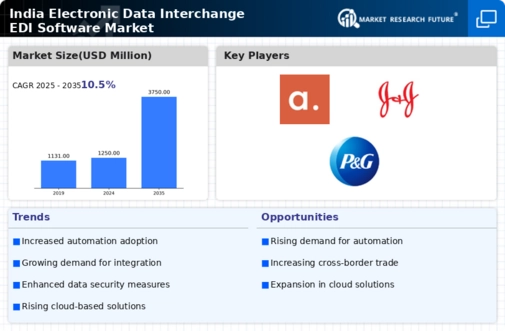Growing Demand for Automation
The increasing demand for automation in business processes is a pivotal driver for The India Electronic Data Interchange Software Market. Organizations are seeking to streamline operations, reduce manual errors, and enhance efficiency. According to recent data, the automation market in India is projected to grow at a CAGR of over 20% in the coming years. This trend is likely to propel the adoption of electronic data interchange (EDI) solutions, as businesses recognize the need for seamless data exchange to support automated workflows. Furthermore, the integration of EDI with existing enterprise resource planning (ERP) systems is becoming commonplace, thereby enhancing the overall operational efficiency of organizations. As a result, the India electronic data interchange software market is expected to witness substantial growth driven by the automation imperative.
Expansion of E-Commerce Sector
The rapid expansion of the e-commerce sector in India serves as a significant driver for the electronic data interchange software market. With the increasing number of online transactions, businesses are compelled to adopt EDI solutions to manage their supply chains effectively. The e-commerce market in India is expected to reach USD 200 billion by 2026, indicating a robust growth trajectory. This growth necessitates efficient data exchange between various stakeholders, including suppliers, logistics providers, and customers. EDI solutions enable real-time data sharing, which is crucial for inventory management and order fulfillment in the e-commerce landscape. Consequently, The India Electronic Data Interchange Software Market is likely to benefit from the burgeoning e-commerce sector, as businesses seek to optimize their operations through effective data interchange.
Regulatory Compliance and Standards
Regulatory compliance is increasingly becoming a critical driver for The India Electronic Data Interchange Software Market. The government has implemented various regulations aimed at enhancing data security and privacy, which necessitates the adoption of EDI solutions. For instance, the Goods and Services Tax (GST) compliance mandates that businesses maintain accurate and timely data exchange with tax authorities. This has led to a surge in demand for EDI software that can facilitate compliance with such regulations. Additionally, organizations are compelled to adhere to international standards, which further drives the need for robust EDI solutions. The emphasis on compliance not only mitigates risks but also enhances the credibility of businesses in the eyes of stakeholders, thereby fostering growth in the India electronic data interchange software market.
Rising Focus on Supply Chain Optimization
The rising focus on supply chain optimization is a key driver for The India Electronic Data Interchange Software Market. Companies are increasingly recognizing the importance of efficient supply chain management in achieving competitive advantage. EDI solutions facilitate real-time communication and data exchange among supply chain partners, thereby enhancing visibility and responsiveness. According to industry reports, organizations that implement EDI can reduce order processing time by up to 50%, which is a compelling incentive for businesses. As supply chains become more complex, the need for integrated EDI solutions that can seamlessly connect various stakeholders is likely to grow. This trend is expected to significantly contribute to the expansion of the India electronic data interchange software market as companies strive for operational excellence.
Technological Advancements and Integration
Technological advancements play a crucial role in driving The India Electronic Data Interchange Software Market. The integration of emerging technologies such as artificial intelligence (AI) and machine learning (ML) into EDI solutions is enhancing their capabilities. These technologies enable predictive analytics, which can optimize data exchange processes and improve decision-making. Furthermore, the rise of cloud-based EDI solutions is making it easier for businesses to adopt and scale their operations. As organizations increasingly seek to leverage technology for competitive advantage, the demand for advanced EDI solutions is likely to rise. This trend indicates a promising future for the India electronic data interchange software market, as businesses look to harness technology to streamline their data interchange processes.













